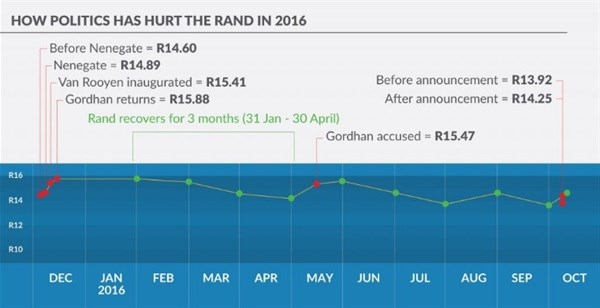In the Financial Times’ December 2016 world predictions for 2017, they stated that there’s “something to be said for the increasingly popular view that political and economic predictions are always and everywhere a waste of breath.” But, it doesn’t stop anyone making them.
Let’s take a look at the general financial forecast for South Africa in 2017.
The rand in retrospect
President Jacob Zuma’s 2015 decision to fire respected Finance Minister Nhlanhla Nene only to switch his replacement four days later with Pravin Gordhan, shook investor confidence. The effects of the South African political landscape on the rand is clear as day on the timeline of the rand/dollar exchange since ‘Nenegate’.
Nene’s unexpected dismissal sent South African markets crashing. The economy was also subject to a number of other internal and external factors like a slowing global economy and the effect of the drought on agriculture. But, with our president’s loyalties having come under the microscope with numerous corruption allegations, the rand has been yoyo-ing between each of his court appearances. Rising on rulings against him, and vice-versa.
The International Monetary Fund’s (IMF) mission chief for South Africa, Laura Papi, said in July last year: “It’s an issue, because it affects investor confidence (and) it makes people want to wait when they are uncertain about what’s going to happen. Investors in particular, (who) have large start-up costs, tend to wait and not invest. In fact, we’ve seen very weak private investment for some time in South Africa”.
Economic forecast: cloudy, with a chance of downgrade
South Africa avoided a ratings downgrade this past December, but the country’s growth is still weighted by high political uncertainty. A number of sources confirm the risk of another rating review by mid-2017, and the ratings agencies’ outlooks are negative.
Continue reading the full article on CompareGuru.





























![Today, Halo and Demographica announce a new specialist agency, Second Rodeo]], headed up by Mike Stopforth (left). Dean Oelschig, managing partner and founder of Halo (right) says they will work as a group but ultimately, each agency will be an individual specialist](https://biz-file.com/c/2505/772543-64x64.jpg?2)

